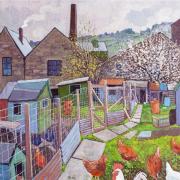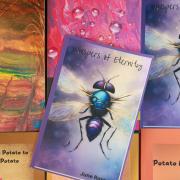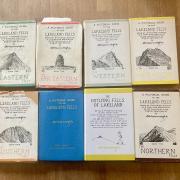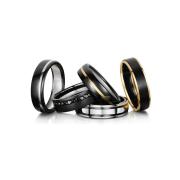A mum from Helmshore is helping to push consumers and producers towards a greener future

A day out at Morecambe should simply have been a chance for Samantha Woodend and her daughter Caitlin to catch up with a friend and enjoy the summer sun. Instead, it was a day which changed Samantha’s life.
As the three women sat on the promenade near the crowded beach, they watched as the crew from a bin lorry struggled to empty overflowing bins as rubbish spilled across the pavement, the road and onto the beach. ‘We asked the council lorry driver for a bin bag and started our first ever litter pick up that day,’ says Samantha.
Shaken by the amount of waste left on that day, Samantha decided to hold a “waste audit” at home, to find out how much rubbish her own family created on a fortnightly basis.
‘We kept buying what we normally would, but when it came to disposing all the wrapping, we first checked to see how much we’d accumulated, and how much of it was deemed non-recyclable.

‘Once we put stuff in the bin, we forget about it. It’s disappeared. Only it hasn’t, and it will most likely go to landfill.’
Looking for ways to help reduce the waste that wasn’t recyclable through their council, Samantha discovered Terracycle, a private recycling company who aim to “eliminate the idea of waste by recycling the so called non-recyclables”.
She signed up to one of Terracycle’s free schemes to be a private collector of hard to recycle materials. Once she had collected a certain amount, she sent the waste in and in turn received reward points for a non-profit organisation of her choice.
Many regular household items are hard to recycle - crisp packets for example are made by fusing foil and plastic and most recycling centres won’t take them as the packages have to be un-fused again for recycling. Walker Crisps has started a collection scheme which also takes different brands’ packages for this costly process, in a step towards fewer emissions and waste production until alternative packaging is ready.
Many companies offer recycling schemes for their products, but people can’t always drive for miles to drop rubbish off at various collection points; the carbon footprint would off-set the good deeds.
That’s why Samantha volunteered to become a collection point for recyclables which she then forwards to the relevant places. Her garage is filled with a colourful collection of bottle caps, stamps, pet food bags, Pringle tubes, markers and much more.
One box is for empty ink cartridges which she forwards to a cancer charity that sells them to a recycling plant. Bottle caps are sent to Scotland to a charity supporting guide dogs.
Although Samantha is a volunteer, her work on waste collection schemes since she signed up in May 2019 has led to big cheques for various charities.
‘People feel bad about all the rubbish they believe to be non-recyclable,’ says Samantha. ‘I just try to make all non-council sponsored recycling easier for them.’
Daughter Caitlin got her school, Haslingden High School, involved and some parents now send their crisp packets, empty toothpaste tubes and other waste to school with their children, for collection.
‘It’s rewarding, of course it is,’ Samatha adds. ‘I might still be texting people at midnight, cars come and go, but at the end of the day, people are on board and it makes a difference. There is also a social aspect to this work and I get to talk to people who might otherwise not see a soul that day.’
A neighbour drops in, bringing waste to be recycled, and says: ‘This has changed my attitude towards shopping. The other day the supermarket’s bananas were all wrapped in plastic, so I refused to buy any. I’ve also switched to refillable products wherever possible.’
And Samantha adds: ‘Sometimes it’s worth checking out the companies we regularly buy, to see what schemes they offer. Some clothing chains will accept used and worn fabrics for recycling, while others still do nothing. Some still use plastic bags while others wrap their items in bio-degradable material.’
Samantha’s council-issue green rubbish bin is almost empty at the end of each week as it awaits collection. Beyond her street the turbines on the high moors above Rossendale turn wind into clean energy as the sun highlights bracken and fell.
‘We love this view, and we love to go for walks up there. It hurts when you see this beauty spoilt by man’s negligence.’
Samantha is hopeful about the future. ‘I never want to preach doom, but spread positivity,’ she says. ‘Reducing and reusing are still the preferable options to recycling. Reducing doesn’t mean we should go without. Local businesses need our support. But think about the environmental impact of what you purchase.’
To find your closest collection point for any recycling scheme, go to terracycle.com and enter the item you’d like to recycle, your postcode, and the closest drop-off points will show on a map.



























